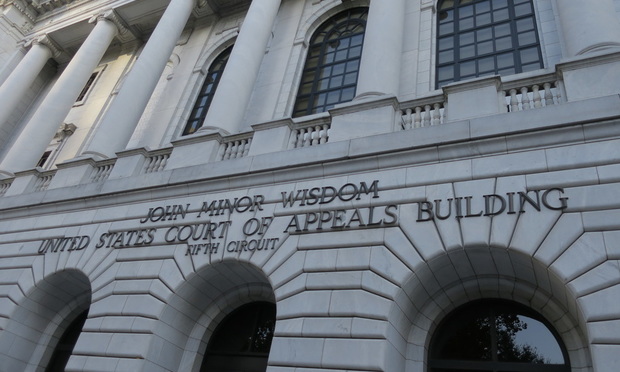5th Circuit Rejects Disabled Plaintiffs' ADA Claims Over Plasma Donations
It's a ruling contrary to one reached on the same issue in a different federal appeals court two years ago, the decision noted.
October 26, 2018 at 04:51 PM
4 minute read
 U.S. Court of Appeals for the Fifth Circuit in New Orleans/photo by Mike Scarcella / ALM Media
U.S. Court of Appeals for the Fifth Circuit in New Orleans/photo by Mike Scarcella / ALM Media
The U.S. Court of Appeals for the Fifth Circuit has prevented a pair of disabled plaintiffs from asserting an Americans with Disabilities Act claim against a plasma collection center after the business declined to take their blood.
It's a ruling contrary to one reached on the same issue in a different federal appeals court two years ago, the decision noted.
The case, Silguero v. CSL Plasma, was filed by Mark Silguero and Amy Wolfe, who allege they attempted to donate plasma but were deferred for reasons related to their disabilities: Silguero uses a cane and has a limp, and Wolfe has anxiety and requires the use of a service animal.
Silguero and Wolfe later sued CSL Plasma, alleging unlawful discrimination under Title III of the ADA and Chapter 121 of the Texas Human Resources Code, in a Southern District of Texas U.S. District Court.
CSL Plasma moved for summary judgment, arguing that its business was neither a “public accommodation” under the ADA nor a “public facility” under the THRC. It also argued that the plaintiffs could not identify a genuine fact issue or show that CSL Plasma had done anything other than impose a legitimate safety requirement.
The trial court agreed with CSL Plasma's arguments and concluded that neither the ADA nor the THRC applied to the plaintiffs' claims.
 Judge Catharina Haynes/courtesy photo
Judge Catharina Haynes/courtesy photoIn its decision, the Fifth Circuit ruled that CSL Plasma was not a “public accommodation.” But the court noted that the U.S. Court of Appeals for the Tenth Circuit had tackled the same ADA question in 2016's Levorsen v. Octapharma Plasma and reached a different conclusion, finding that the federal law applied to plasma centers because they were “service establishments.”
“We disagree with the Tenth Circuit, however, about whether plasma collection centers provide a 'service' to customers,” wrote Judge Catharina Haynes.
“Here, CSL Plasma pays donors who receive no detectable benefit from the act of donation. Its entire business model is structured this way,” Haynes wrote. “It thus does not offer plasma collection as a 'service' to the public and is therefore not a 'service establishment.' We affirm the district court's order granting summary judgment to CSL Plasma on Silguero's and Wolfe's ADA claims.”
But the court declined to rule on whether CSL Plasma was a “public facility” under the THRC because Texas state courts had not definitively interpreted the term. Instead, the Fifth Circuit referred that issue to the Texas Supreme Court via certified question.
Sasha Samberg-Champion, a lawyer with the Washington, D.C., civil rights law firm Relman Dane & Colfax who represents the plaintiffs in the case, was disappointed in the ruling, noting that it “contradicts the Tenth Circuit's decision on the same question and is contradictory to the Justice Department's view under both the Obama and Trump administrations.''
Samberg-Champion, who partnered with nonprofit Disability Rights Texas in the case, said that Congress' intent in passing the Title III ADA was to guarantee that every commercial entity was open to people with disabilities. “We don't think it was intended to create loopholes, such as the plasma center here, by arguing their business model takes them out of Title III,'' he said.
Bruce Douglas, a shareholder in Ogletree, Deakins, Nash, Smoak & Stewart who represents CSL Plasma, did not immediately return a call for comment.
This content has been archived. It is available through our partners, LexisNexis® and Bloomberg Law.
To view this content, please continue to their sites.
Not a Lexis Subscriber?
Subscribe Now
Not a Bloomberg Law Subscriber?
Subscribe Now
NOT FOR REPRINT
© 2025 ALM Global, LLC, All Rights Reserved. Request academic re-use from www.copyright.com. All other uses, submit a request to [email protected]. For more information visit Asset & Logo Licensing.
You Might Like
View All
Foley Partner Wrapping Up Long Legal Career, 29 Years of Chairing MLK Jr. Oratory Competition in Houston
3 minute read
Texas-Based Ferguson Braswell Expands in California With 6-Lawyer Team From Orange County Law Firm
2 minute read

Crypto Entrepreneur Claims Justice Department’s Software Crackdown Violates US Constitution
4 minute readTrending Stories
- 1Decision of the Day: Judge Dismisses Defamation Suit by New York Philharmonic Oboist Accused of Sexual Misconduct
- 2California Court Denies Apple's Motion to Strike Allegations in Gender Bias Class Action
- 3US DOJ Threatens to Prosecute Local Officials Who Don't Aid Immigration Enforcement
- 4Kirkland Is Entering a New Market. Will Its Rates Get a Warm Welcome?
- 5African Law Firm Investigated Over ‘AI-Generated’ Case References
Who Got The Work
J. Brugh Lower of Gibbons has entered an appearance for industrial equipment supplier Devco Corporation in a pending trademark infringement lawsuit. The suit, accusing the defendant of selling knock-off Graco products, was filed Dec. 18 in New Jersey District Court by Rivkin Radler on behalf of Graco Inc. and Graco Minnesota. The case, assigned to U.S. District Judge Zahid N. Quraishi, is 3:24-cv-11294, Graco Inc. et al v. Devco Corporation.
Who Got The Work
Rebecca Maller-Stein and Kent A. Yalowitz of Arnold & Porter Kaye Scholer have entered their appearances for Hanaco Venture Capital and its executives, Lior Prosor and David Frankel, in a pending securities lawsuit. The action, filed on Dec. 24 in New York Southern District Court by Zell, Aron & Co. on behalf of Goldeneye Advisors, accuses the defendants of negligently and fraudulently managing the plaintiff's $1 million investment. The case, assigned to U.S. District Judge Vernon S. Broderick, is 1:24-cv-09918, Goldeneye Advisors, LLC v. Hanaco Venture Capital, Ltd. et al.
Who Got The Work
Attorneys from A&O Shearman has stepped in as defense counsel for Toronto-Dominion Bank and other defendants in a pending securities class action. The suit, filed Dec. 11 in New York Southern District Court by Bleichmar Fonti & Auld, accuses the defendants of concealing the bank's 'pervasive' deficiencies in regards to its compliance with the Bank Secrecy Act and the quality of its anti-money laundering controls. The case, assigned to U.S. District Judge Arun Subramanian, is 1:24-cv-09445, Gonzalez v. The Toronto-Dominion Bank et al.
Who Got The Work
Crown Castle International, a Pennsylvania company providing shared communications infrastructure, has turned to Luke D. Wolf of Gordon Rees Scully Mansukhani to fend off a pending breach-of-contract lawsuit. The court action, filed Nov. 25 in Michigan Eastern District Court by Hooper Hathaway PC on behalf of The Town Residences LLC, accuses Crown Castle of failing to transfer approximately $30,000 in utility payments from T-Mobile in breach of a roof-top lease and assignment agreement. The case, assigned to U.S. District Judge Susan K. Declercq, is 2:24-cv-13131, The Town Residences LLC v. T-Mobile US, Inc. et al.
Who Got The Work
Wilfred P. Coronato and Daniel M. Schwartz of McCarter & English have stepped in as defense counsel to Electrolux Home Products Inc. in a pending product liability lawsuit. The court action, filed Nov. 26 in New York Eastern District Court by Poulos Lopiccolo PC and Nagel Rice LLP on behalf of David Stern, alleges that the defendant's refrigerators’ drawers and shelving repeatedly break and fall apart within months after purchase. The case, assigned to U.S. District Judge Joan M. Azrack, is 2:24-cv-08204, Stern v. Electrolux Home Products, Inc.
Featured Firms
Law Offices of Gary Martin Hays & Associates, P.C.
(470) 294-1674
Law Offices of Mark E. Salomone
(857) 444-6468
Smith & Hassler
(713) 739-1250






